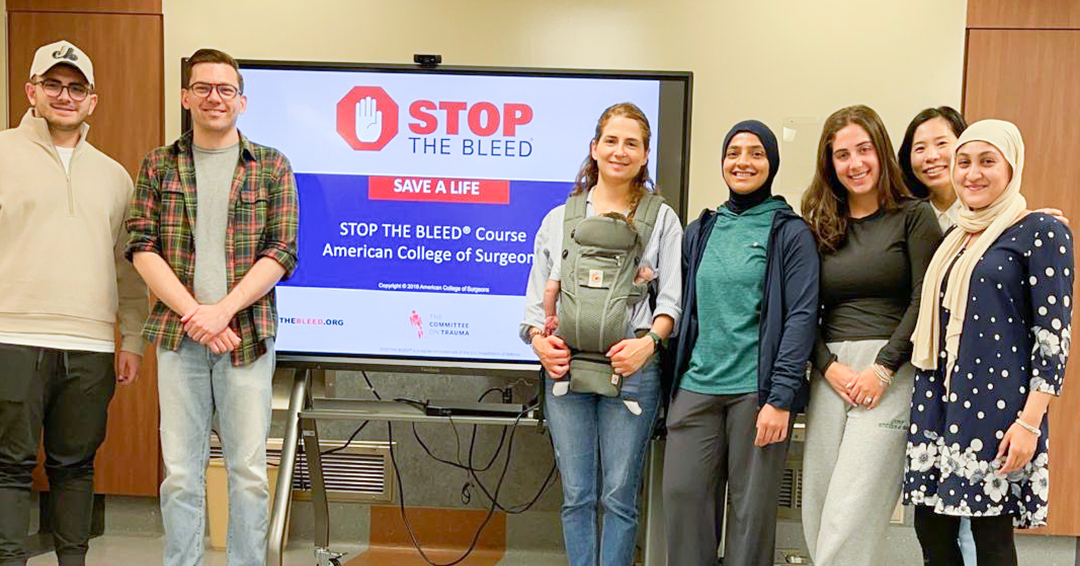
The Simulation Interprofessional Learners Committee (SILC), which is currently seeking new members, offers hands-on training on bleeding control to the general public.
Fayeza Ahmad remembers the panic she felt when her mother injured her thumb and started bleeding.
“I wasn’t in medical school then, and I was freaking out,” she recalls. Though she had learned how to perform CPR in the fourth grade, for a bleeding emergency, she was unsure of how to help her mother while waiting for professional care.
The moment stuck with Fayeza, now a third-year medical student at McGill and co-lead of the Simulation Interprofessional Learners Committee (SILC) at the Steinberg Centre for Simulation and Interactive Learning (SCSIL). Through the committee, she met like-minded students like Grace Al Hakim, a PhD student at the Ingram School of Nursing (ISoN) and co-lead of SILC.
A qualified nurse from Lebanon, Grace had taught Stop The Bleed, a simulation-based course created and accredited by the American College of Surgeons, in Beirut. The course, offered worldwide, gives members of the public the skills to stop life-threatening bleeding before medical help arrives.
“Unfortunately, there was a high chance of this happening in Beirut at that time, and that’s why we were trying to teach people about those first aid techniques,” she explains. “That way, bystanders can help before [first responders] come, so they can help save a life.”
Together with their fellow committee members, Grace and Fayeza are set to offer Stop The Bleed to communities in Quebec this spring and summer. Passionate about increasing health literacy and equipping underserved population with skills to improve their health outcomes, they are seeking healthcare students from across the Faculty of Medicine and Health Sciences to join them.
Emergency response training for non-health professionals
Stop The Bleed begins by teaching basic principles behind the treatment of bleeding emergencies. It then moves to a hands-on and simulation-based workshop, teaching participants how to recognize where a bleed may be on a person’s body, packing a wound, as well as applying a tourniquet and direct pressure techniques.
“It also reassures the audience that it’s not their responsibility to do everything for the patient,” Grace adds. “Their responsibility is just to apply the techniques they learnt in the course, call for help and that’s it. By just doing this in time, community members can save the patient’s life.”
For Fayeza, Stop The Bleed is “an incredibly important course that everyone in the community should have access to, because you don’t have to be a doctor, surgeon, nurse or healthcare professional to be able to act on someone who is bleeding and really change their outcomes.”
SILC is specifically offering the course to underserved communities in Quebec who face barriers to accessing healthcare. Their goal is to continue expanding this initiative to empower individuals across the province, with the ultimate aim of improving health outcomes and potentially saving lives. On May 20, the committee offered the workshop to 25 students at the Kahnawà:ke Survival School.
New members
Supported by Jeffrey Wiseman, MDCM, MEd, Director of Education at the SCSIL and Faculty Member at the IHSE, and Junko Tokuno, MD, MSc, Education Manager at the SCSIL, SILC is on the lookout for new members before the next academic year.
Any junior healthcare students who wish to promote community awareness of controlling bleeding emergencies, as well as educational activities for McGill learners, are encouraged to apply through this link before the end of August 2025.
“I really like what we’re doing in SILC, because I have the opportunity to work with students from other programs and disciplines in healthcare,” says Grace. “It teaches us how to work together and to understand why other specialties in healthcare are important in their roles.”
For more information, contact Fayeza Ahmad or Grace Al Hakim at silcsteinbergcentre@gmail.com or follow SILC on Instagram (@SILC_Steinberg_Centre).

